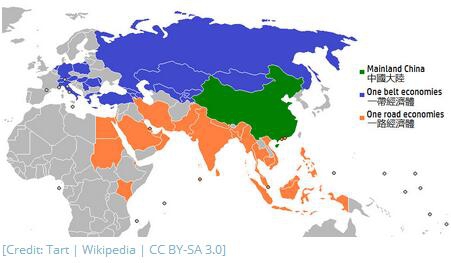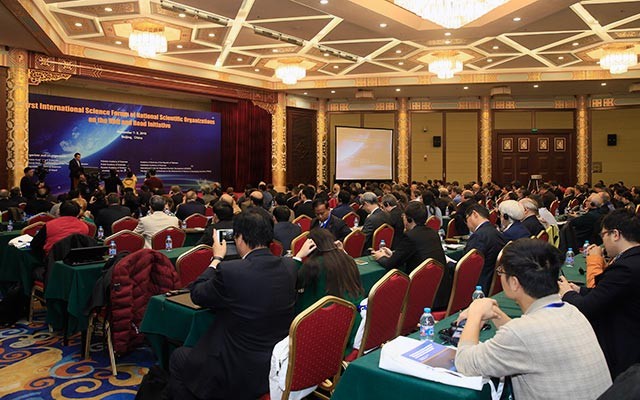TWAS: a key role in "Beijing Declaration"
Dec 09, 2016Edward W. Lempinen
Scientific cooperation in the broad "Belt and Road" region could help deliver the benefits of shared development to billions of people. Over 350 scientists and experts meeting in Beijing explored how to bring the plan to reality.
 Chinese Academy of Sciences President Bai Chunli, who also serves as TWAS president, played a leading role at the forum. [Photo courtesy Chinese Academy of Sciences]
Chinese Academy of Sciences President Bai Chunli, who also serves as TWAS president, played a leading role at the forum. [Photo courtesy Chinese Academy of Sciences]
An ambitious vision for using science and technology cooperation to support shared development for billions of people living in the "Belt and Road" region was endorsed at a major international meeting in China.
At the first-ever International Science Forum of National Scientific Organizations on the Belt and Road Initiative, TWAS joined more than 20 national scientific organisations and a number of international organizations in issuing the Beijing Declaration. The statement calls for improved scientific cooperation in the region, which extends from the Western Pacific across Asia to Africa and Europe.
"The Belt and Road Initiative aiming at shared development harmonizes the fundamental interests of the international community and adds a new positive force to peace and development in the world," the declaration says. "National and regional scientific organizations, scientists and experts from different fields need to strengthen cooperation by sharing of information and joining their efforts together in the supply of continuous and strong scientific support to the shared development and common prosperity."
 In 2013, Chinese President Xi Jinping proposed the Silk Road Economic Belt and the 21st Century Maritime Silk Road. Known as the Belt and Road initiative, it is a unified framework for development and cooperation in a region that touches three continents and their contiguous oceans and seas, with human population numbering in the billions.
In 2013, Chinese President Xi Jinping proposed the Silk Road Economic Belt and the 21st Century Maritime Silk Road. Known as the Belt and Road initiative, it is a unified framework for development and cooperation in a region that touches three continents and their contiguous oceans and seas, with human population numbering in the billions.
The initiative has drawn support from over 100 countries, and already has led to establishment of the Silk Road Fund; the expansion of trade and business; the development of high-speed railways; a deepening of communication on policy and enhanced exchanges between people and cultures in the region. Projects under the initiative are expected to multiply in the years ahead.
The Belt and Road region spans diverse geography and human cultures, but the countries face a spectrum of shared challenges, including environmental protection and a need for sustainable development. At the International Science Forum, held 7-8 November – the overarching idea was that science, technology and innovation (STI) are essential to address these challenges. Scientific cooperation across the region is, therefore, critical.
Chinese Academy of Sciences (CAS) President Bai Chunli, who also serves as president of TWAS, played a leading role in the forum. Mohamed Hassan, TWAS interim executive director, also attended the forum. Hassan and CAS Vice President Tan Tieniu, a TWAS Fellow, moderated a discussion on the role of STI in shared development.
"The Belt and Road initiative is an historic opportunity for countries to share resources, knowledge and experience in support of shared development," Bai said. "The International Science Forum of National Scientific Organizations is a positive recognition that science, technology and innovation will be central to the success of this initiative. TWAS clearly has an important role play, and many valuable contributions to offer."
"The Beijing Declaration articulates a very important and promising view on the potential impact of scientific cooperation in a region that covers much of the earth," said Hassan. "At the core of this framework is a key understanding: Developed and developing nations in the Belt and Road initiative can work together to strengthen STI. That will benefit not just involved countries, but the whole world."
The Beijing Declaration sets a platform for long-term for STI cooperation, including bi-lateral and multi-lateral programmes, to focus on major challenges confronting the region.
Participants at the meeting agreed to consider establishment of a network of national science and research organizations along the Belt and Road route to develop joint STI activities. In addition, TWAS will sit on a board that will plan the next International Science Forum of National Scientific Organizations on the Belt and Road Initiative.
Such cooperation, says the Beijing Declaration, will be based on "the timeless values of peace and cooperation, openness and inclusiveness, mutual learning and mutual benefit, all to advance prosperity and peace."

The International Science Forum of National Scientific Organizations on the Belt and Road Initiative
Edward W. Lempinen
